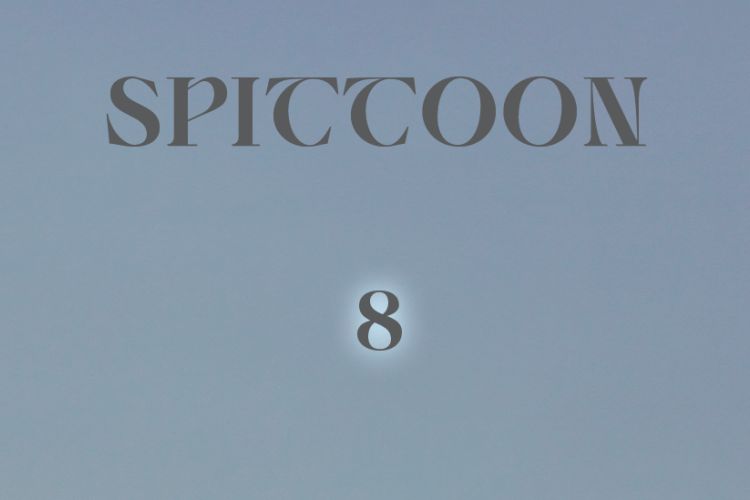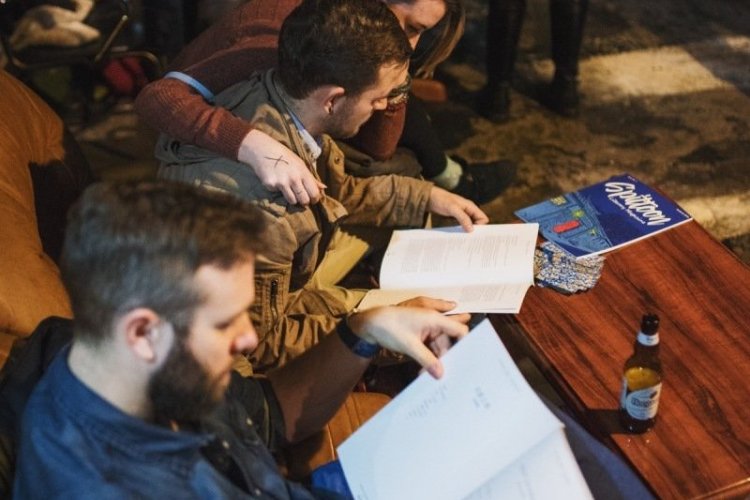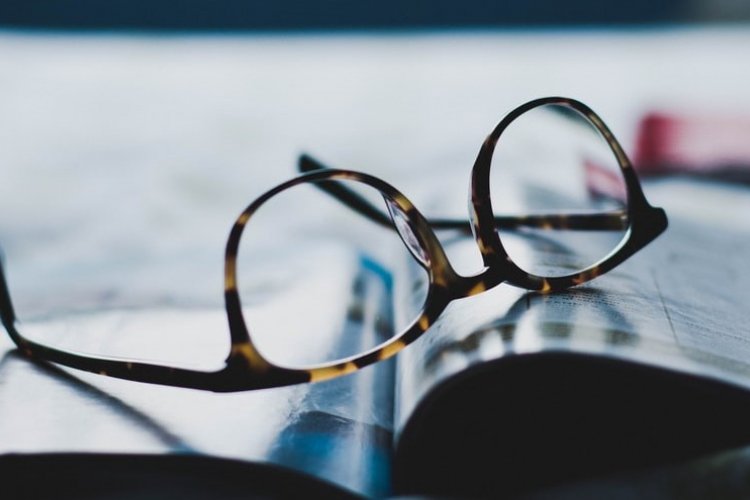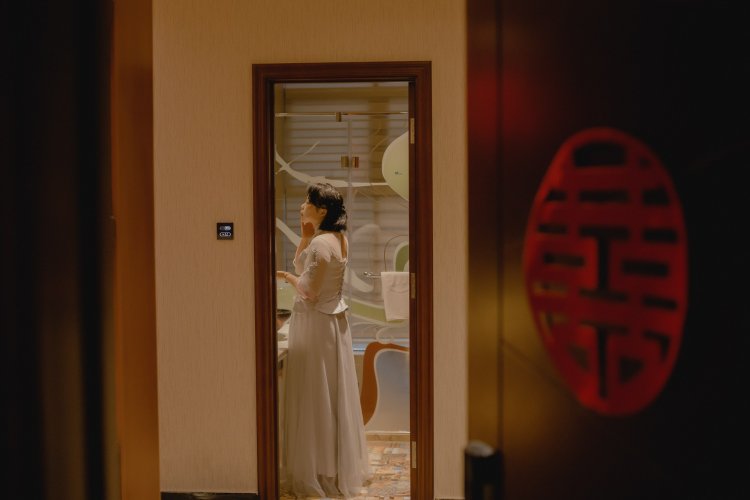Spittoon Presents: Night and the Pickle
This work of fiction is provided by our content partners Spittoon Collective. You can read more content just like this from Beijing's creative literary minds via their website here. You can also find the original article here.
***
This is a long trip.
A whole afternoon and most of a night’s drive, and we are still well into most of the night. Dad is a rigid silhouette in front of the wheel. Mom, eyes closed, sways gently in the seat beside him. Unable to sleep, I’ve been ordered to shut my eyes. Silence is all my parents require when they demand sleep, so I sit awake, staring out my window at the mountains. They are huge, dark waves rolling against the night sky and the car feels like it is sliding to the bottom of giant swells.
I’m tired, hungry, and 10 years old. These mountains, the black sky and time passing turn this night into dark water.
Jimmy, my little brother who is tucked in blankets in the rear window, sneezes, making me aware of a smell in the air that has settled unnoticed into my breathing. My sister Margaret, as awake as I am but younger and less sure, has her nose covered by her blanket, her eyes wide and nervous.
I lean forward and take in the picture framed by the front windshield. We are gliding down one side of a mountain towards a bridge linking two valleys. At the bottom, emergency flares burn furiously. They march away from us, surrounding something huge and wounded lying on the span. As we drive onto the bridge, I can’t see its opposite end.
In a moment we join a line of cars that have stopped at the burning boundary created by the flares. No traffic approaches from the other end. In the dark, headlight lit strangers move slowly around and between idling cars, a deep water dance I watch through the windshield. In their steps I receive my first lesson in wariness.
In our lights I see a policeman break away from a small group quietly talking outside the car ahead of us.
I pry my body between the seats, head between Mom and Dad, well into their private place. But we are entering a suspended world of emergency and caution, of circling red lights, of primitive attention, and they don’t notice.
Dad rolls down his window and looks up at the approaching policeman.
“What is it?”
The policeman bends toward the window and before he answers we smell it. It’s more than a smell. It presses over his shoulder, past his gun in its black leather holster, snaking up our noses, sinking into our clothes and hair.
“An accident.”
He moves on to the family in the car slowing behind us, their unease readable in their uncertain braking.
Jimmy sneezes again.
The bodies drifting outside the windshield shift position and I see a large trailer truck has flipped onto its side. Its cab has twisted well into the oncoming lane, while its injured trailer lies on the bridge, its back end smashed through the bridge’s protective barrier where one of its rear doors has opened and swings out into open air.
His eyes on the wreckage, Dad speaks to Mom. “I’ll have a look.”
Then, on this bridge, in this night, I risk my first step out of childhood.
“Can I come?”
Dad looks at Mom, asking a silent parental question. Mom turns to me.
“Stay close to your Father.”
I back out between the seats and glance at Jimmy who is taking in the thickly sour smell, mouth open and hands moving on his clothes in his attempt to brush off scent.
Then I am out of the car and into the night. I watch Dad’s left hand closely, waiting for it to swing out a few inches from his body, the universal signal for hand holding, a command I must obey. Will I be placed in the position of having to choose between holding my fathers’ hand in front of strangers, or staying in the car and missing this? I hesitate, keep one step back.
He moves his head, not his hand, and looks into my eyes. This is a test for both of us and we know it.
“Stay beside me.”
For the first time he offers me his trust, and we start away from the women and the baby, equals.
We move quietly forward among the quiet cars who have pulled themselves tight to each other as wagon trains in danger will. In the cars with families, children rub their eyes and lift themselves to peer over the front seats and their mothers’ shoulders. Fathers have gotten out of the cars to gather near the trailer, voices for each other, eyes following the policeman. They are in the dark with strangers, taking opportunities to reassure each other that this is no more than what they are required to deal with daily. Doesn’t this moment, like it does me, fill their senses, startle them, make them unsure? No, it is only a delay.
We pass the car sitting closest to the truck. Through his window a boy my age watches me. He is alone, his Dad gone to join the rest. I wonder if he is being ignored, punished, or forgotten. He looks at my Dad and then at his own, a figure appearing, disappearing among the lights. The boy raises himself in the seat, puts his arms against the dash, his forehead against the front window. I promise myself to smell, to touch, to listen, to look for both of us.
We approach the flares. They own this piece of the road, but Dad ignores them and passes through. I follow the exact line his safe path makes until we come to within a few feet of the trailer. The night, the red flashing light from the police car, the safe but shaken truck driver huddled in his cab, the breakage around us and the bridge combine to raise wonder and mystery in me. For a moment, I am in a church burning unusually bad incense.
“Watch your feet.”
Dad has his hand on my shoulder, noticing what I hadn’t, my right foot advancing towards a shattered glass jar. I look around and there is another, another and another. The highway is covered with shattered glass and the bodies of drowned dills. Forcibly freed from their tanks, they are bulbous, curved, reluctant to roll, a mob of dark bodies who settle where they’ve landed or pile up against the curbs.
Their juice has sluiced from one side of the bridge to the other and is still escaping from the back of the trailer in a thin stream. It has given the surface of the highway depth, a quality of reflection. Among the broken glass and pickles, I see the night sky and the stars.
At its source, the smell is part of the night, the bridge, my Dad and the lights. It is more than thick, more than strong. If the concrete of the bridge had been mixed with juice, if the bridge crossed a river of juice below, if it were raining juice and juice flowed in my veins, this smell would make sense. I breathe in air that burns, acid and sour, sweet and sharp. Tasting it on my tongue, in my nose and on my skin, it is my first high. The first time I’m attracted to the truly strange.
“Come back here.”
Dad has watched me inch my way towards the shattered bridge rail. I move well back, beside him, glad of his reassuring presence in this high and unsettling place.
The rear wheels of the truck have come dangerously close to following the end of the trailer off the bridge. It has slid sideways, amok. Cases of pickles continue to break open as the juice, freed from hidden, shattered bottles inside, work on the fibre of the cardboard and seep through. First stain, then soak, then split and at last, surrender. Broached, the solid cases collapse quickly, and intact jars slide out like newborns. It is a slow, glacial process, the weight of the freed jars gathering until, in a rush, they roll to the open doors of the trailer and out into the dark air. From far below, we can hear their explosive concussions.
I move back and Dad moves forward. He wants the edge too, and my boldness challenges him.
“Stay here.”
He walks to the section of ripped open railing, moving much closer to the edge than I had. The policeman watches him, poised to rebuke. For a moment Dad becomes me, pulled too close by wonder, watched by stern, worried eyes. Then he moves to the left, where the rail is unbroken. The policeman and I relax. Dad speaks without turning, his voice quiet in the blackness.
“Come here.”
I go to him. The railing fits my armpits when my elbows rest on top and I stand on my toes. This is how I will meet heights from now on. On my toes, pressed against the barrier, pushing forward to grasp what I can of freedom, yet often thankful to be held back. Dad stands firm, his feet planted just the right distance apart from each other and the rail, hands in pockets. At that moment, he is everything that is strength for me and I relax, safe in his careless calm. We share a view into the eternal. Beyond the rail, there is nothing. Too dark to know distance, too high to know ground, our isolation is sounded in the viscid detonation of the jars below.
“Okay. Let’s go.”
We leave the railing, he less quickly than I. I feel lighter for the view. He’s been made heavier. I run back through the strange cars and knots of people. There is no demand to, “slow down!” from behind. For the first time he has given me his faith, and for the first time I’ve given him co-operation rather than obedience. He allows me acceleration in return. I spill into the back seat of the car, describing everything to my sister Margaret, making no sense, leaving the reality of it all outside where it is, where it belongs. But I try.
Dad climbs in beside Mom and starts the car.
“How much longer?” she asks.
“Pretty soon.”
She rests her head against the glass, trying to get tonight the rest she’ll need tomorrow.
A dump truck passes us and stops beside the police car. The policeman walks toward it, talks up at the window. As he steps back, yellow lights ignite on top of the truck. It backs away from him and passes us again in reverse. Air brakes, a pause, then forward again, the blade on its front end lowered to the highway. The truck passes us, pushing pickles, cardboard, glass and juice. The policeman begins to swing his flashlight, slow arcs that move us forward. Slowly, in order, each car takes its place in line behind the truck. We pass the trailer and then the cab. Lying on its side, its underbelly is skeletal and vulnerable, how great cats look in surrender.
The families waiting in cars on the other side of the bridge stare at us as we pass. We are primitives, sharing mystery. They look to see if we have felt what they have felt. They seek eyes like their own in the passing headlights. Then, once again, we find our familiar speeds and begin to separate.
Like this and want more? Click here to read Spittoon's last fiction piece Pay Your Respects.
Image courtesy of Spittoon







